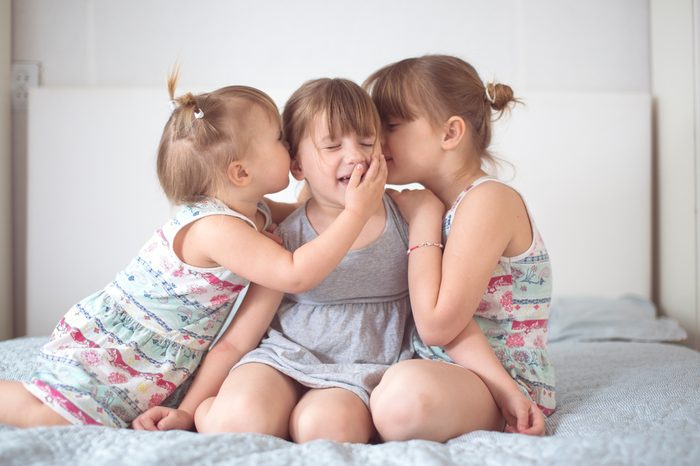
Middle children have strong friendships and relationships
A middle child tends to prioritize relationships outside of the family unit, according to Lisa Lewis, MD. “Middle children, probably because they feel overlooked, will have a tendency to create stronger friendships and long-term relationships,” Lewis says. They rely more heavily on relationships with their peers than with family as they see outsiders meeting their needs for emotional support, Nedra Glover Tawwab, Licensed Clinical Social Worker and Owner of Kaleidoscope Counseling in Charlotte, NC adds. Here are the facts that prove having friends is ridiculously healthy.

Middle children are great mediators
Most middle children are peacekeepers. Since they are sandwiched between other siblings, they are often obsessed with fairness and balance. GinaMarie Guarino, a Licensed Mental Health Counselor Family Therapist, says that middle children also tend to manage conflict between siblings as well. “A middle child will hold a special relationship with each sibling, which helps him or her be able to mediate between the two and provide a balance between the oldest and youngest,” Guarino says.

Middle children are wonderful negotiators
When middle children aren’t mediating family fights, they are making solid points for their own agendas. Thanks to good listening skills and patience, they know how to grab their parents’ attention—and negotiate for what they want. Or, as Frank Sulloway, Ph.D. puts it, “Middle-borns are the most willing to wheel and deal.”

Middle children are easygoing
Being good mediators also helps middles compromise—meaning they are more likely to go with the flow rather than act stubborn of contentious, Guarino says. Plus, some parents may have more relaxed parenting styles by the time the second kid comes around. This is how your birth order could impact your health.

Middles are innovative
According to Katrin Schumann, co-author of The Secret Power of Middle Children, middles like to effect change more than any other birth order. That is thanks to their openness and willingness to try new things. One study found that middles are 85 percent more open to new ideas compared to the 50 percent of firstborns.

Middle children are more independent
Since middles tend to form healthy relationships outside the home, they also tend to fuse less with their parents. “They are neither overcompensating in terms of taking on family responsibilities like the oldest sibling nor depending on others like the youngest,” says Katie Davis, PsyD. Although it may seem like siblings compete for their parents’ attention and “fusion,” middles who are less fused actually grow up to be healthier, better-adjusted adults, Davis says. “They benefit from the emotional distance they need to differentiate themselves as individuals,” she adds.

Middle children are self-motivated
The independence that drives middle children also makes them self-motivated. Schumann says middles are used to working hard for their accomplishments—as well as recognition from their parents. So these hard-working justice seekers fight for what they want in life. Try these smart ways to stop sibling rivalry before it starts.

Middle children are successful
Of all the U.S. presidents since 1787, about 52 percent were middle children. And successful middles don’t stop at the presidency. Many successful entrepreneurs, including Bill Gates and Warren Buffett, are middle children. Research shows that common middle child traits—including independence and strong negotiating skills—help middles take more risks and work hard leading to more life success.

Middle children are good co-workers
With both younger and older siblings, middles get the best of both worlds. They have one sibling to look up to and one to set an example for. Plus, relating well to both older and younger people is an added bonus to their work relationships. One study published in The Journal of Genetic Psychology found that middle kids do better in group activities and have higher social scores than the eldest or youngest children, making them great team players.

Middle children don’t crack under pressure
According to one study, firstborn kids have a higher risk of having depression than middle or last born kids. Firstborns are typically under more pressure to succeed for their parents’ sake. Middles, on the other hand, are less likely to be too hard on themselves as they go through life’s disappointments as an adult. Another study in Spain found that middles are less likely to develop other emotional disorders or be diagnosed with ADHD.

Middle children are great parents
Once middles grow and start creating their own family, they often become good parents. A study found that middle children give their kids structure and rules, while also giving them a little freedom to make choices. In comparison, last-borns care less about rules and structure when it comes to their children. These are the bizarre ways your siblings affect you as a grown-up.

Middle kids have level-heads
Middle children aren’t known for being spoiled, or being “the favorite,” but they are known for being “good.” A study done by Texas Christian University and the University of Minnesota looked at peer acceptance and rejection in relation to birth order. They found that middle kids are the most well-adjusted of the family. Here’s what your birth order reveals about you.

Remember, birth order only impacts personality so much
Although there are common traits of middle children, there are many other factors that contribute to a kids personality than their birth order. Arlene B. Englander, LCSW, MBA, a Columbia University-trained licensed psychotherapist, says that some elements could include the gender of the other siblings, the economic situation of the family, and divorce. For example, if the middle child is the only male, he might get special treatment regardless of being born after his sister. “In short, birth order may provide us with informative data in some situations, but we need to look at the whole picture and avoid stereotypes when seeking answers about how persons became who they are today,” Englander adds. Next, check out these habits healthy families always have.
[Source: Psychology Today]
